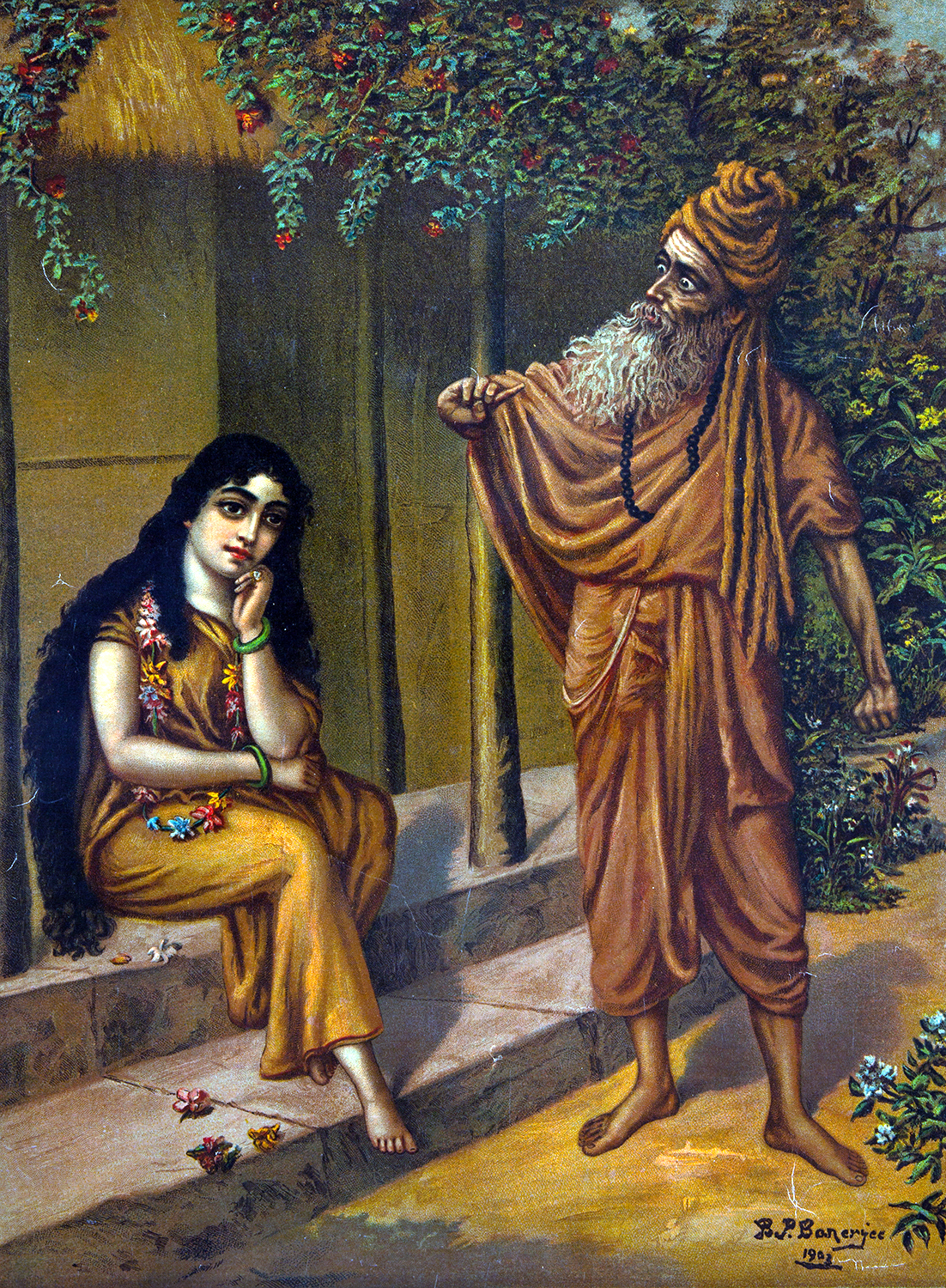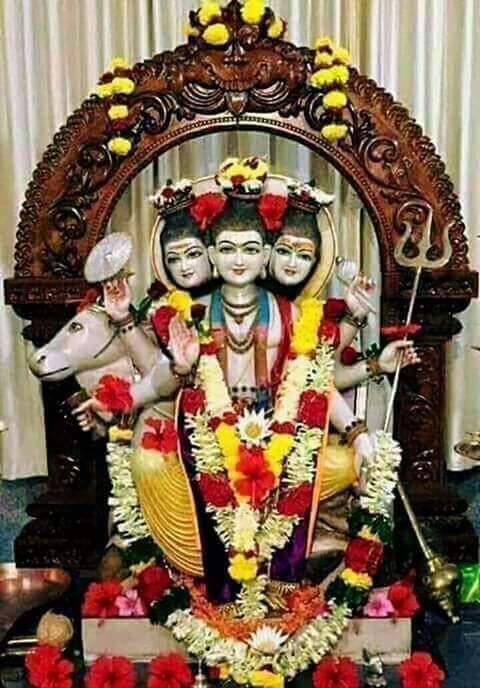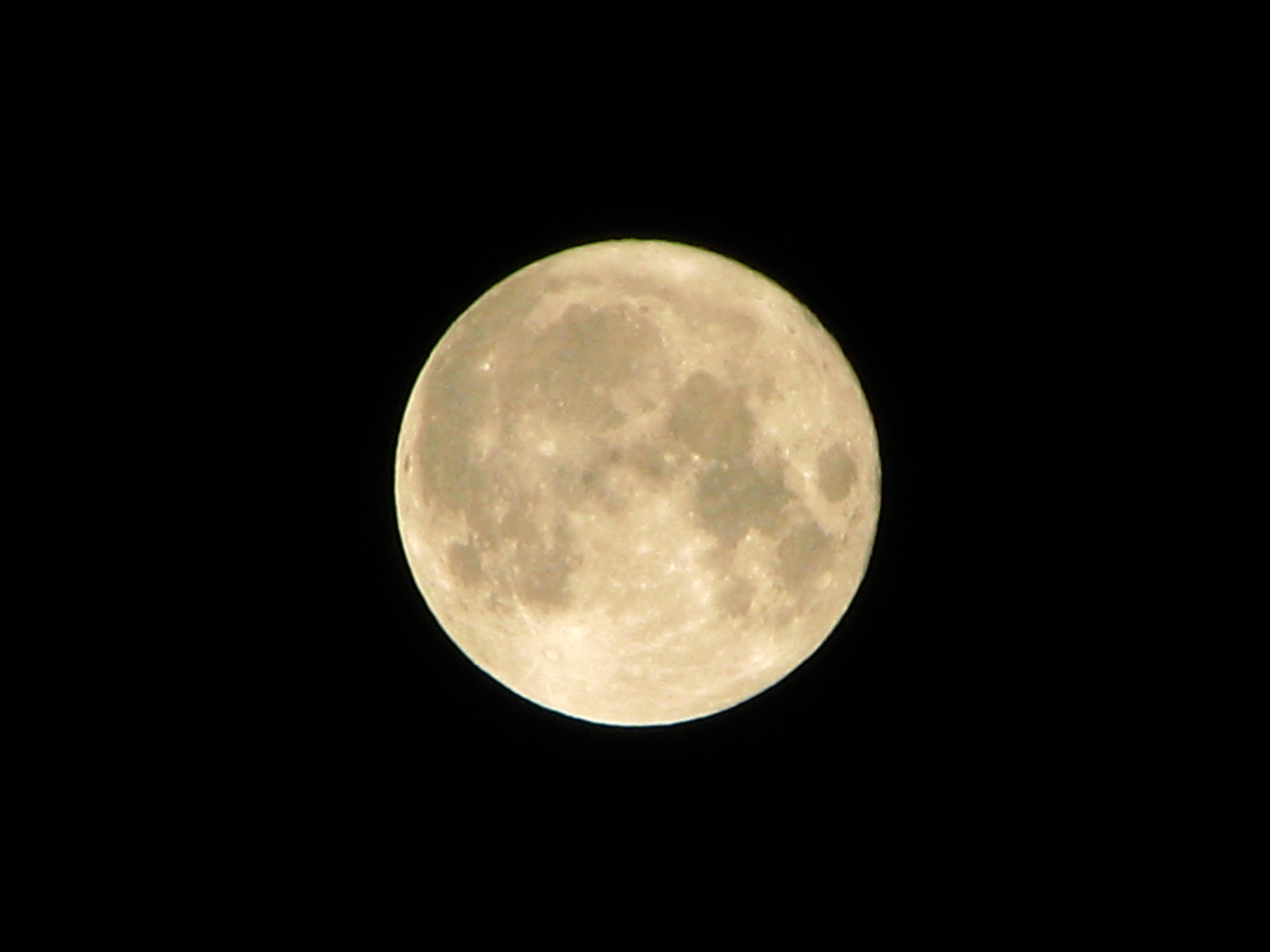|
Durvasa
In Hindu scriptures, Durvasa ( sa, दुर्वासा, ) also known as Durvasas (Sanskrit: दुर्वासस्), is a legendary rishi (sage). He is the son of Anasuya and Atri. According to some Puranas, Durvasa is a partial avatar of Shiva, known for his short temper. Wherever he goes, he is received with great reverence by humans and devas alike. Curses and boons The rishi Durvasa, being short-tempered, is said to have both cursed and gifted boons to several notable deities and people in the Hindu scriptures. Some of them include: Curses # Indra, whom he cursed to lose all his powers, after Indra's elephant Airavata threw down a rather fragrant garland given by Durvasa to Indra. # Saraswati, whom he cursed to be born as a human because she laughed at his incorrect recitation of the Vedas. # Rukmini, whom he cursed to be separated from her husband, Krishna, because she drank water without seeking Durvasa's permission. # Shakuntala, who avoided Durvasa while at t ... [...More Info...] [...Related Items...] OR: [Wikipedia] [Google] [Baidu] |
Rukmini
Rukmini ( sa, रुक्मिणी, , ) is a Hindu goddess and the first queen and chief wife of Krishna. In Vaishnava tradition, she is described as Krishna's principal queen in Dvaraka, as well as the chief of his wives. She is an incarnation of the goddess of prosperity, Lakshmi. The goddess is regarded to be the chief or principal consort of Krishna in various pieces of literature and is venerated primarily in Warkari and Haridasa tradition, and additionally in Sri Vaishnavism where Lakshmi-Narayana are revered and worshipped. Rukmini is mainly worshipped in Maharashtra and South India. The people of Maharashtra venerate her with Vithoba (a regional form of Krishna) and call her Rakhumai. In South India, she is worshipped along with Krishna and his other primary consort Satyabhama. Etymology and epithets The name ''Rukmini'' is derived from the Sanskrit word ''Rukma'' which means 'Radiant', 'Clear' or 'Bright'. The name can also mean 'decorated with gold ornamen ... [...More Info...] [...Related Items...] OR: [Wikipedia] [Google] [Baidu] |
Dushyanta
Dushyanta ( sa, दुष्यन्त, translit=Duṣyanta) is a king of the Chandravamsha (Lunar) dynasty featured in Hindu literature. He is the husband of Shakuntala and the father of Bharata. He appears in the Mahabharata and in Kalidasa's play, Abhijnanashakuntalam ( 300 CE). Legend According to the ''Mahabharata'', Dushyanta is the son of Ilin and Rathantī, also rendered Ilina and Rathantara, respectively. According to primogeniture, Dushyanta succeeds his father, for he is the eldest among his siblings Sura, Bhima, Pravashu, and Vasu. He rules as the king of Hastinapura. Mahabharata The Mahabharata narrates that King Dushyanta was once hunting in the forests, when he struck a fawn with his arrow. The fawn fled to the ashrama of Sage Kanva, and the king followed it. Upon reaching the ashrama, the king saw Shakuntala watering the plants, accompanied by her friends, named Anasuya and Priyamvada. Dushyanta and Shakuntala fell in love with each other. Since the ... [...More Info...] [...Related Items...] OR: [Wikipedia] [Google] [Baidu] |
Shakuntala
Shakuntala (Sanskrit: ''Śakuntalā'') is the wife of Dushyanta and the mother of Emperor Bharata. Her story is told in the '' Adi Parva'' of the ancient Indian epic ''Mahabharata'' and dramatized by many writers, the most famous adaption being Kalidasa's play ''Abhijñānaśākuntala'' (''The Sign of Shakuntala''). Legends Birth Once, Vishvamitra started to meditate to earn the status of a Brahmarshi. The intensity of his penance frightened Indra. He feared that Vishvamitra might want his throne. To end his penance, Indra sent Menaka, an apsara, to lure him and bring him out of his penance. Menaka reached Vishwamitra's meditating spot and started to seduce him. Vishvamitra could not control his lust and desire and his penance was broken. Vishvamitra and Menaka lived together for a few years and a daughter was born to them. Later, Vishvamitra realized that all those things were Indra's tricks. He realized that he needed to control his emotions. Vishvamitra left Menaka and Me ... [...More Info...] [...Related Items...] OR: [Wikipedia] [Google] [Baidu] |
Atri
Atri ( sa, अत्रि) or Attri is a Vedic sage, who is credited with composing numerous hymns to Agni, Indra, and other Vedic deities of Hinduism. Atri is one of the Saptarishi (seven great Vedic sages) in the Hindu tradition, and the one most mentioned in its scripture Rigveda. The fifth Mandala (Book 5) of the Rigveda is called the Atri Mandala in his honour, and the eighty seven hymns in it are attributed to him and his descendants. Atri is also mentioned in the Puranas and the Hindu epics of the Ramayana and the Mahabharata. Legend Atri is one of the seven great Rishi or Saptarshi along with Marichi, Angiras, Pulaha, Kratu, Pulastya and Vashistha. According to the legends of the Vedic era, sage Atri was married to Anasuya Devi. They had three sons, Dattatreya, Durvasa and Chandra. As per divine account, he is the last among the seven saptharishis and is believed to have originated from the tongue. The wife of Atri was Anasuya, who is considered one of the seven ... [...More Info...] [...Related Items...] OR: [Wikipedia] [Google] [Baidu] |
Kunti
Kunti ( sa, कुन्ती, ), named at birth as Pritha ( sa, पृथा, ), is one of the prominent characters of the Hindu epic ''Mahabharata''. She is best known as the mother of the Pandavas and Karna, the main protagonists of the epic. She is described to be beautiful, intelligent, and shrewd. Born to the Yadava chief Shurasena, Pritha was adopted by her childless uncle, Kuntibhoja, and was renamed Kunti. During her teenage years, she impressed sage Durvasa and was blessed with the knowledge of a divine ''mantra''. Out of curiosity, she used the mantra to invoke the sun god Surya, and was blessed with a son named Karna. As he had been born out of wedlock, Kunti had to abandon him to save herself from dishonor. After reaching adulthood, she chose Pandu, the king of Kuru, as her husband, but her married life was disturbed when Madri, princess of Madra, became Pandu's second wife. One day, Pandu was cursed that he would perish instantly if he tried to touch any of his ... [...More Info...] [...Related Items...] OR: [Wikipedia] [Google] [Baidu] |
Anasuya
Anasuya () is an ascetic, and the wife of Sage Atri in Hinduism. She is the daughter of Devahuti and Sage Kardama in Hindu texts. In the ''Ramayana'', she lives with her husband in a small hermitage on the southern border of the Chitrakuta forest. A pious woman who leads an austere life, she is described as having miraculous powers. Anasuya is the sister of the sage Kapila, who also served as her teacher. She is extolled as ''Sati Anasuya'' (Ascetic Anasuya) and ''Mata Anasuya'' (Mother Anasuya), the chaste wife of Sage Atri. She becomes the mother of Dattatreya, the sage-avatar of Vishnu, Chandra, a form of Brahma, and Durvasa, the irascible sage avatar of Shiva. When Sita and Rama visit her during their exile, Anasuya is very attentive to them, giving the former an unguent that would maintain her beauty forever. Etymology Anasuya is composed of two Sanskrit words: ''ana'' and ''asūya,'' translating to the 'one who is free from jealousy or envy'''. Legend Origin The gene ... [...More Info...] [...Related Items...] OR: [Wikipedia] [Google] [Baidu] |
Dattatreya
Dattatreya ( sa, दत्तात्रेय, ), Dattā or Dattaguru, is a paradigmatic Sannyasi (monk) and one of the lords of yoga, venerated as a Hindu god. In Maharashtra, Goa, Andhra Pradesh, Telangana, Karnataka, Gujarat, and Madhya Pradesh he is a syncretic deity, In Bengal he is known as 'Trinath', avatar of the three Hindu gods Brahma, Vishnu, and Shiva, who are also collectively known as the Trimurti. In other regions, and some versions of texts such as Garuda Purana, Brahma Purana and Sattvata Samhita, he is an avatar of Vishnu only. Several Upanishads are dedicated to him, as are texts of the Vedanta-Yoga tradition in Hinduism. One of the most important texts of Hinduism, namely Avadhuta Gita (literally, "song of the free soul") is attributed to Dattatreya. Over time, Dattatreya has inspired many monastic movements in Shaivism, Vaishnavism, and Shaktism, particularly in the Deccan region of India, south India, Gujarat, Madhya Pradesh, Rajasthan and Himalayan regi ... [...More Info...] [...Related Items...] OR: [Wikipedia] [Google] [Baidu] |
Chandra
Chandra ( sa, चन्द्र, Candra, shining' or 'moon), also known as Soma ( sa, सोम), is the Hindu god of the Moon, and is associated with the night, plants and vegetation. He is one of the Navagraha (nine planets of Hinduism) and Dikpala (guardians of the directions). Etymology and other names The word "Chandra" literally means "bright, shining or glittering" and is used for the "Moon" in Sanskrit and other Indian languages.''Graha Sutras'' by Ernst Wilhelm, published by Kala Occult Publishers p. 51 It is also the name of various other figures in Hindu mythology, including an asura and a Suryavanshi king. It is also a common Indian name and surname. Both male and female name variations exists in many South Asian languages that originate from Sanskrit. Some of the synonyms of Chandra include ''Soma'' (distill), ''Indu'' (bright drop), ''Atrisuta'' (son of Atri), ''Shashin'' or ''Shachin'' (marked by hare), ''Taradhipa'' (lord of stars) and ''Nishakara'' (the ni ... [...More Info...] [...Related Items...] OR: [Wikipedia] [Google] [Baidu] |
Shiva
Shiva (; sa, शिव, lit=The Auspicious One, Śiva ), also known as Mahadeva (; ɐɦaːd̪eːʋɐ, or Hara, is one of the principal deities of Hinduism. He is the Supreme Being in Shaivism, one of the major traditions within Hinduism. Shiva is known as "The Destroyer" within the Trimurti, the Hindu trinity which also includes Brahma and Vishnu. In the Shaivite tradition, Shiva is the Supreme Lord who creates, protects and transforms the universe. In the goddess-oriented Shakta tradition, the Supreme Goddess ( Devi) is regarded as the energy and creative power (Shakti) and the equal complementary partner of Shiva. Shiva is one of the five equivalent deities in Panchayatana puja of the Smarta tradition of Hinduism. Shiva has many aspects, benevolent as well as fearsome. In benevolent aspects, he is depicted as an omniscient Yogi who lives an ascetic life on Mount Kailash as well as a householder with his wife Parvati and his three children, Ganesha, Kartikeya and A ... [...More Info...] [...Related Items...] OR: [Wikipedia] [Google] [Baidu] |
Dvārakā
Dvārakā, also known as ''Dvāravatī'' (Sanskrit द्वारका "the gated ity, possibly meaning having many gates, or alternatively having one or several very grand gates), is a sacred historic city in the sacred literature of Hinduism, Jainism,See Jerome H. Bauer "Hero of Wonders, Hero in Deeds"Vasudeva Krishna in Jaina Cosmohistory in and Buddhism. It is also alternatively spelled as Dvarika. The name Dvaraka is said to have been given to the place by Krishna, a major deity in Hinduism. Dvaraka is one of the Sapta Puri (seven sacred cities) of Hinduism. In the ''Mahabharata'', it was a city located in what is now Dwarka, formerly called Kushasthali, the fort of which had to be repaired by the Yadavas. In this epic, the city is described as a capital of the Anarta Kingdom. According to the ''Harivamsa'' the city was located in the region of the Sindhu Kingdom. In the Hindu epics and the Puranas, Dvaraka is called Dvaravati and is one of seven Tirtha (pilgrima ... [...More Info...] [...Related Items...] OR: [Wikipedia] [Google] [Baidu] |
Sahadeva
Sahadeva (Sanskrit: सहदेव) was the youngest of the Pandava brothers, the five principal protagonists of the epic ''Mahabharata''. He and his twin brother, Nakula, were blessed to King Pandu and Queen Madri by invoking the twin gods Ashvins. Sahadeva is described to be skilled in swordsmanship and astrology. During the Kurukshetra War, he slew many warriors including Shakuni. Etymology The word sahadeva is derived from two Sanskrit words ''saha'' (सह) and ''deva'' (देव). ''Saha'' means ''with'' and ''deva'' is a Hindu term used for ''deity''. So literally, Sahadeva means ''with Gods''. Another meaning is ''thousand Gods''. Sahadeva and his brother Nakula, are both called as ''Ashvineya'' (आश्विनेय), as they were born from Ashvins. Birth and early years Due to Pandu's inability to bear children (because of the curse of Rishi Kindama), Madri had to use the boon given to Kunti Devi by Sage Durvasa to give birth, who invoked the Ashwini Kumaras t ... [...More Info...] [...Related Items...] OR: [Wikipedia] [Google] [Baidu] |
Pandava
The Pandavas (Sanskrit: पाण्डव, IAST: Pāṇḍava) refers to the five legendary brothers— Yudhishthira, Bhima, Arjuna, Nakula and Sahadeva—who are the central characters of the Hindu epic ''Mahabharata''. They are acknowledged as the sons of Pandu, the King of Kuru, but were fathered by different ''Devas'' (gods) due to Pandu's inability to naturally conceive children. In the epic, the Pandavas married Draupadi, the princess of Panchala, and founded the city of Indraprastha after the Kuru Kingdom was split to avoid succession disputes. After their paternal cousins the Kauravas—led by Duryodhana—tricked them into surrendering their kingdom and refused to return it, the Pandavas waged a civil war against their extended family, and this conflict was known as the Kurukshetra War. With the help of the god Krishna, the Pandavas eventually won the war with the death of the Kauravas, albeit at great cost. Etymology The word ''Pandava'' ( sa, पाण्डव ... [...More Info...] [...Related Items...] OR: [Wikipedia] [Google] [Baidu] |












